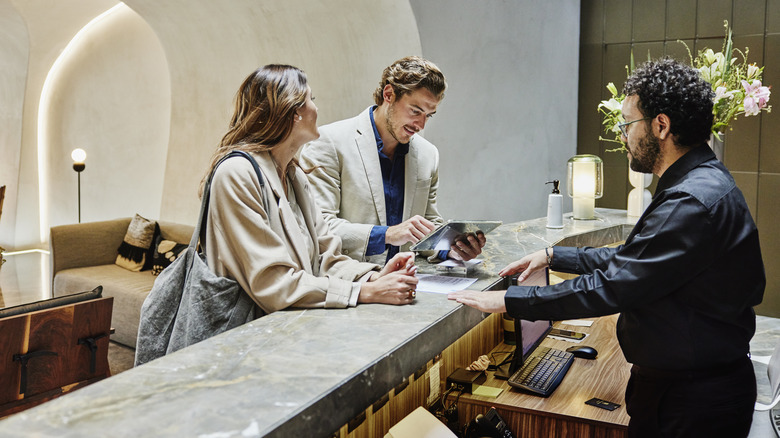The Hotel Secret That Travelers Are Kept In The Dark About
As an essential part of the hospitality industry, hotels are diligently people-focused. Hotel staffers are supposed to create experiences that will increase chances of returning guests and keep them in good standing on review sites (even though you should think twice before trusting such sites). Of course not all hotels are created equal, but some definitely go above and beyond to make a positive repertoire with guests. But sometimes this can feel a bit creepy when they know things about you that you never told them.
Hotel staffers obviously take note of where their guests are from, how long they are staying, perhaps the reason they are visiting, and any special requests they've made. Much of this information comes with the booking itself, but some hotels also keep track of details like whether you visited the hotel spa, left online reviews for other travel experiences, and more. Redditors with insights on working at luxury hotels have chimed in on this hotel secret in an r/AskReddit thread. "We take notes on your reservation profile," said u/dez_navi. "Everything from anniversary information to fav[orite] cocktails and foods. Add notes to pass along to other staff."
Hotels collect data on guests in order to personalize their stays
Hotels do not keep track of your likes, dislikes, or other personal information just for fun. They do so in order to curate the best experience possible for each guest and be almost a mind reader. Perhaps a hotel could offer a free dessert on a guest's birthday, for example. While personalized things like birthday perks are nice gestures, the digital age has brought a drawback for any organization that holds customer data. As with hospitals and credit card companies, hotels are not immune from hackers who want to steal sensitive guest information from the hotel's databases. While these hackers may not care about your favorite cocktail, they will care about your contact and banking information from the hotel's records.
Staying in any type of lodging will involve some sort of information exchange. However, what should ease consumers' minds is the fact that privacy laws like those found in Europe's General Data Protection Regulation (GDPR) force hotels to get consent from guests before tracking personal data. Be sure to look out for this when you're making a reservation on a hotel booking website or ask hotel staff what data they store if you have concerns. But for the most part, the system will be used for harmless things, like making the whole team aware of your allergies, which type of room you prefer, or ensuring they pronounce your name correctly.

